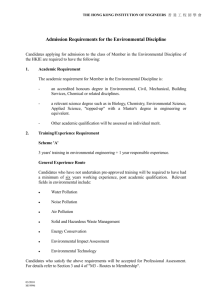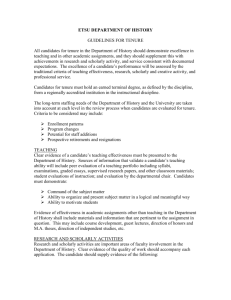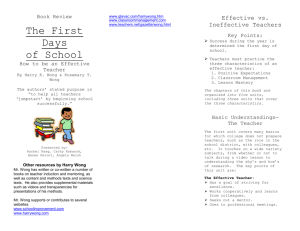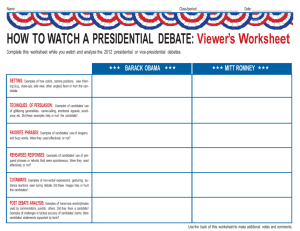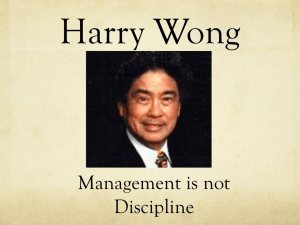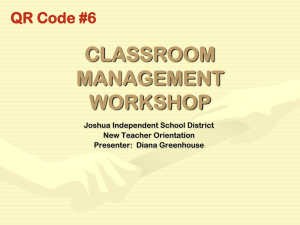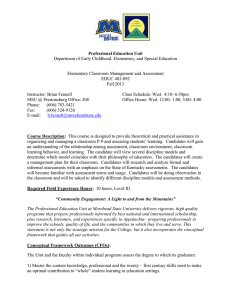EDUC 482 - Sharon Benton - Morehead State University
advertisement
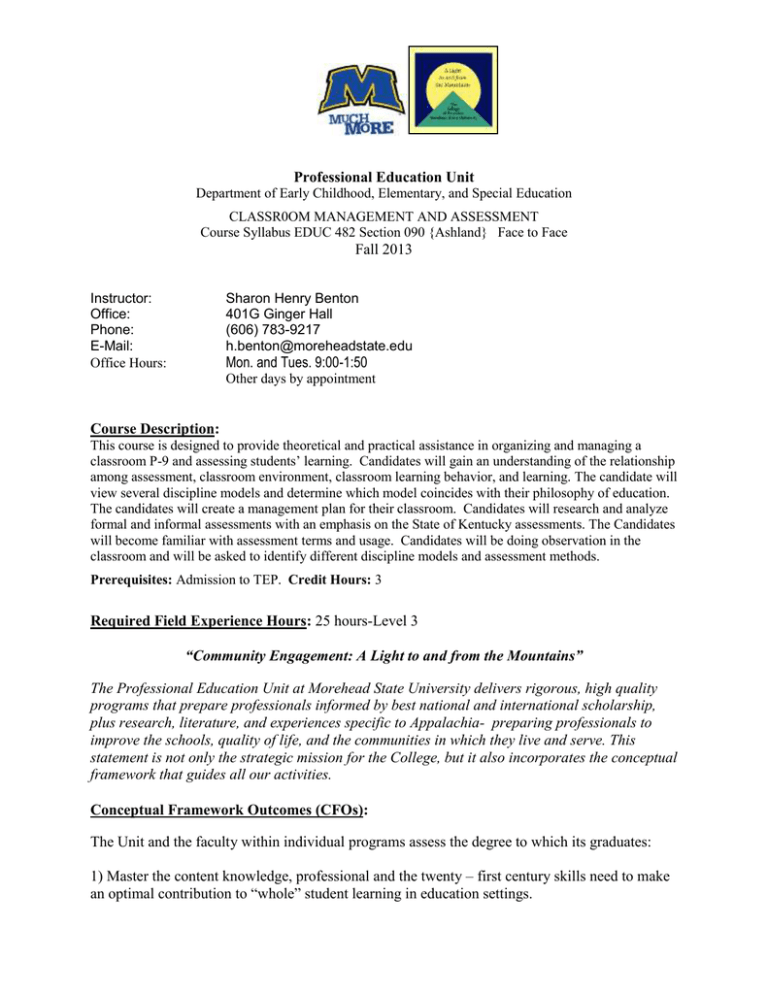
Professional Education Unit
Department of Early Childhood, Elementary, and Special Education
CLASSR0OM MANAGEMENT AND ASSESSMENT
Course Syllabus EDUC 482 Section 090 {Ashland} Face to Face
Fall 2013
Instructor:
Office:
Phone:
E-Mail:
Office Hours:
Sharon Henry Benton
401G Ginger Hall
(606) 783-9217
h.benton@moreheadstate.edu
Mon. and Tues. 9:00-1:50
Other days by appointment
Course Description:
This course is designed to provide theoretical and practical assistance in organizing and managing a
classroom P-9 and assessing students’ learning. Candidates will gain an understanding of the relationship
among assessment, classroom environment, classroom learning behavior, and learning. The candidate will
view several discipline models and determine which model coincides with their philosophy of education.
The candidates will create a management plan for their classroom. Candidates will research and analyze
formal and informal assessments with an emphasis on the State of Kentucky assessments. The Candidates
will become familiar with assessment terms and usage. Candidates will be doing observation in the
classroom and will be asked to identify different discipline models and assessment methods.
Prerequisites: Admission to TEP. Credit Hours: 3
Required Field Experience Hours: 25 hours-Level 3
“Community Engagement: A Light to and from the Mountains”
The Professional Education Unit at Morehead State University delivers rigorous, high quality
programs that prepare professionals informed by best national and international scholarship,
plus research, literature, and experiences specific to Appalachia- preparing professionals to
improve the schools, quality of life, and the communities in which they live and serve. This
statement is not only the strategic mission for the College, but it also incorporates the conceptual
framework that guides all our activities.
Conceptual Framework Outcomes (CFOs):
The Unit and the faculty within individual programs assess the degree to which its graduates:
1) Master the content knowledge, professional and the twenty – first century skills need to make
an optimal contribution to “whole” student learning in education settings.
2) Are competent in the collection and use of data to inform decision – making and to
demonstrate accountability for student learning.
3) Demonstrate professional dispositions
4) Are culturally competent and understand the regions from which they have come utilizing
knowledge and experiences to effectively “bridge the gaps” (economic, achievement, and
geographic) ensuring optimal learning for all students.
5) Engage in authentic field experiences in collaboration with committed school – based partners
and are empowered to improve the quality of education throughout this region and beyond.
Student Learning Outcomes (SLOs): By the end of this course, the candidate will be able to:
The General goal of this course is to acquaint the candidate with methods and techniques for management
and assessment of elementary and middle school classrooms. By the end of this course, the candidate will:
1. Study and research the principle concepts and implementation of seven models for positive
classroom management.
2. Approach the discipline of students with a holistic approach that addresses student achievement,
behavioral patterns, diversity, and the school as a community.
3. View the realism of the classroom through scheduled field experience and discuss common
issues and classroom observations with practitioners.
4. Demonstrate knowledge of assessment and discipline models in relationship to their values,
beliefs, and teaching methods.
5. Analyze teacher and student action observed in a classroom and reflect on the various
components of the discipline models and assessment practices.
6. Analyze and evaluate the purpose of various assessment practices used in classroom settings.
7. Conduct an assessment analysis.
8. Read, discuss, and write about various aspects of diversity in the classroom: Socio-economic,
ethnicity, ESL, Exceptionalities, and gender.
9. Understand the teacher’s role in situations where student abuse is suspected.
10. Synthesize understanding of the importance of values and beliefs and their influence on
classroom management , assessment, and discipline models.
11. Develop an assessment plan that demonstrates understanding of assessment principles.
NCATE/ EPSB Accreditation Alignment of CFOs and SLOs:
Program:
Aligned
with
Assessment
(point
values)
[ program title ]
Kentucky
Teacher
Standards
(KYS)
[ course title ]
Kentucky
Core
Academic
Standards
(KCAS)
Education
Professional
Standards
Board
(EPSB)
SPA
Association
for
Childhood
Education
International
Elementary
Education
Standards
NCATE
Classroom
Participation/
Activities
CFO: 1, 3, 9,
10
SLO: 4, 5
III: Creates/Maintains
Learning Environment; IV:
Implements/Manages
Instruction; VI: Technology;
VIII: Collaborates with
Colleagues/Parents/
Others; IX: Evaluates
teaching and implements
professional development
Learning Goal
3:
Students shall
develop their
abilities to
become self
sufficient.
EPSB:
Diversity,
Closing the
Achievement
Gap,
Technology
Goal 4:
Responsible
Group
Membership
Field
Experience
(200)
CFO: 1 -5
SLO: 1-3, 5, 7,
8
I: Content Knowledge; II:
Plans Instruction; III:
Creates/Maintains Learning
Environment; IV:
Implements/Manages
Instruction; V: Assess and
Communicates results; VI:
Technology; VII: Reflects
and evaluates teaching ;
VIII: Collaborates with
Colleagues/Parents/
Others; IX: Evaluates
teaching and implements
professional development.
Goal 6:
Connect and
Integrate
Knowledge
AE 6.1:
Candidates will
develop skills
in integration
of curriculum
in order to help
students make
connections.
AE 2.37:
Students
demonstrate
skills and work
habits that lead
to success in
future
schooling and
work.
EPSB:
Diversity,
Assessment,
Closing the
Achievement
Gap
3.3
Development
of critical
thinking and
problem
solving—
Candidates
understand
and use a
variety of
teaching
strategies that
encourage
elementary
students’
development
of critical
thinking and
problem
solving.
Standard 3.4
Active
engagement in
learning—
Candidates use
their
knowledge and
understanding
of individual
and group
motivation and
behavior
among students
at the K6 level to foster
active
engagement in
learning, self
motivation, and
positive social
interaction and
to create
supportive
learning
environments;
Diversity,
Technology,
Evaluation,
Intellectual
Integrity
Standard 5.1
Professional
growth,
reflection and
evaluation—
Intellectual
Integrity,
Diversity
Diversity,
Technology,
Professional
Community,
Performance
Assessment.
AE 3:
Candidates will
learn how
classroom
management
can aid
students to
become self
sufficient.
Reading
Reflection
(50)
CFO: 1,3, 4
SLO: 8, 9
I: Content Knowledge; III:
Creates/Maintains Learning
Environment; IX: Evaluates
teaching and implements
professional development
Learning Goal
5:
Students shall
develop their
abilities to
Diversity,
Closing the
Achievement
Gap
connect and
integrate
experiences and
new knowledge
from all subject
matter fields
with what they
have previously
learned and
build on past
learning
experiences to
acquire new
information
through various
media sources.
AE 1.2:
Students make
sense of the
variety of
materials they
read. AE 1.11:
Students write
using
appropriate
forms,
conventions,
and styles to
communicate
ideas and
information to
different
audiences for
different
purposes. AE 3:
Candidates will
learn how
classroom
management
can aid students
to become self
sufficient.
Presentation
(100)
Presentation
CFO: 1, 3
SLO: 1,4, 6
I: Content Knowledge; II:
Plans Instruction; IV:
Implements/Manages
Instruction; VI:
Technology; ;
VIII: Collaborates with
Colleagues/Parents/Others;
X: Leadership
Learning Goal
5:
Students shall
develop their
abilities to
connect and
integrate
experiences
and new
knowledge
from all subject
matter fields
with what they
have
previously
learned and
build on past
learning
experiences to
acquire new
information
through various
Candidates are
aware
of and reflect
on their
practice in light
of research on
teaching,
professional
ethics, and
resources
available for
professional
learning; they
continually
evaluate the
effects of their
professional
decisions and
actions on
students,
families and
other
professionals in
the
learning
community and
actively seek
out
opportunities to
grow
professionally;
EPSB:
Diversity,
Technology,
Closing the
Achievement
Gap
2.1 Reading,
Writing, and
Oral
Language—
Candidates
demonstrate a
high
level of
competence in
use of English
language arts
and they know,
understand,
and use
concepts from
reading,
language and
child
development,
to teach
reading,
writing,
NCATE:
Performance
Assessment,
Intellectual
Integrity,
Professional
Community
media sources.
AE 2.37:
Students
demonstrate
skills and work
habits that lead
to success in
future
schooling and
work.
AE 1.11:
Students write
using
appropriate
forms,
conventions,
and styles to
communicate
ideas and
information to
different
audiences for
different
purposes.
speaking,
viewing,
listening, and
thinking skills
and to help
students
successfully
apply their
developing
skills to many
different
situations,
materials,
and ideas;
First Day
Brochure
(100)
CFO: 1, 3, 4
SLO: 4, 9, 10
I: Content Knowledge;
VI: Technology;
Learning Goal 5:
Students shall
develop their
abilities to
connect and
integrate
experiences and
new knowledge
from all subject
matter fields
with what they
have previously
learned and build
on past learning
experiences to
acquire new
information
through various
media sources.
AE 1.11:
Students write
using appropriate
forms,
conventions, and
styles to
communicate
ideas and
information to
different
audiences for
different
purposes.
EPSB:
Diversity,
Closing the
Achievement
gap
Discipline
Model (100)
I: Content Knowledge;
VI: Technology; IX:
Evaluates teaching and
implements professional
development
Learning Goal
5:
Students shall
develop their
abilities to
connect and
integrate
EPSB:
Diversity;
Closing the
Achievement
Gap,
Technology
CFO: 1, 3, 4
SLO: 1, 4
5.2
Collaboration
with families,
colleagues, and
community
agencies—
Candidates
know the
importance of
establishing
and
maintaining a
positive
collaborative
relationship
with families,
school
colleagues, and
agencies in the
5-07
3
larger
community to
promote the
intellectual,
social,
emotional,
physical
growth
and well-being
of children.
Standard 5.1
Professional
growth,
reflection and
evaluation
NCATE:
Technology,
Intellectual
Integrity,
Performance
Assessment
NCATE:
Technology,
Intellectual
Integrity,
Professional
Community
experiences and
new knowledge
from all subject
matter fields
with what they
have previously
learned and
build on past
learning
experiences to
acquire new
information
through various
media sources.
AE 1.11:
Students write
using
appropriate
forms,
conventions,
and styles to
communicate
ideas and
information to
different
audiences for
different
purposes.
Web of
Values and
Beliefs (50)
and Summary
(50)
CFO: 2, 3, 4
SLO: 2, 4, 8,
9, 10
III: Creates/Maintains
Learning Environment;
IV:
Implements/Manages
Instruction; V: Assess
and Communicates
results; VII: Reflects
and evaluates teaching
Learning Goal
5:
Students shall
develop their
abilities to
connect and
integrate
experiences
and new
knowledge
from all
subject matter
fields with
what they
have
previously
learned and
build on past
learning
experiences to
acquire new
information
through
various media
sources.
AE 1.11:
Students write
using
appropriate
forms,
conventions,
and styles to
communicate
EPSB:
Diversity;
Closing the
Achievement
Gap
Standard 5.1
Professional
growth,
reflection and
evaluation
NCATE:
Technology,
Intellectual
Integrity,
Professional
Community
ideas and
information to
different
audiences for
different
purposes.
AE 3:
Candidates
will learn how
classroom
management
can aid
students to
become self
sufficient.
Assessment
Analysis
(100)
CFO: 1,2,3,4
SLO: 1, 2, 10
Standard I: Content
Knowledge; V: Assess
and Communicates
results
Learning
Goal 5:
Students shall
develop their
abilities to
connect and
integrate
experiences
and new
knowledge
from all
subject matter
fields with
what they
have
previously
learned and
build on past
learning
experiences to
acquire new
information
through
various media
sources.
AE 1.11:
Students write
using
appropriate
forms,
conventions,
and styles to
communicate
ideas and
information to
different
audiences for
different
purposes.
EPSB:
Closing the
Achievement
Gap,
Assessment
4.0 Assessment
for
instruction—
Candidates
know,
understand,
and use formal
and informal
assessment
strategies to
plan, evaluate
and strengthen
instruction
that will
promote
continuous
intellectual,
social,
emotional, and
physical
development of
each
elementary
student.
NCATE:
Intellectual
Integrity,
Professional
Community,
Evaluation
AE 6.3:
Students
expand their
understanding
of existing
knowledge by
making
connections
with new
knowledge,
skills, and
experiences.
Assignment Descriptions:
Program:
[ program title ]
Assessment (point value)
[ course title ]
Description
Class Participation
Participation in class activities is an important part of learning. In class
activities such as the Critical Performance {Assessment Analysis} is
completed during class and is part of the participation grade.
Field Experience {25 Hours}
(400)
During the field experience, the candidate will engage in several
management activities. The field experience for this class has a minimum of
25 hours attached to it, although candidates may find that they will need to
spend extra hours in or out of the classroom to complete their management
activities. Candidates will gather contextual data on the school and classroom
and complete an assessment analysis while at the school. Complete
assignment details will be handed out or posted on blackboard and reviewed
in class.
Candidates will read A Child Called It This is intended to provide the
candidate with insights into diversity and abuse. Complete assignment details
will be handed out or posted on blackboard and reviewed in class. Also,
reading of Harry Wong’s The First Days of School –How to Be an Effective
Teacher is a required reading and reflecting assignment.
Candidates will collaborate to present information concerning classroom
management and/or assessment. While the use of technology is encouraged,
the use of power point is not required. Use your teaching skills to share
information with the class. Complete assignment details will be handed out
or posted on blackboard and reviewed in class.
Candidates will design a first day brochure that reflects their philosophy of
education, values and beliefs, and discipline plan. Complete assignment
details will be handed out or posted on blackboard and reviewed in class.
Candidates will develop their discipline/behavior plan, and their classroom
procedures, integrating both a discipline model and their values. Complete
assignment details will be handed out or posted on blackboard and reviewed
in class.
Candidates will create a visual model of their beliefs and values that they
wish to incorporate in their classroom. These will be presented orally in
class. A written paper which summarizes the presentation will be completed.
Complete assignment details will be handed out or posted on blackboard and
reviewed in class.
Candidates will collect and analyze data. Candidates will reflect on the date
and develop an action plan for the teacher. Complete assignment details will
Packets will divide the points
into various segments and
activities within classroom.
Reading Reflection:
(50)
(100)
Presentation
First Day Brochure (100)
Classroom Discipline Model
and Behavior Plan (100)
Web of Values and Beliefs
(50) Summary
Assessment Analysis (100)
Assessment Terminology and
Planning (50)
Research on 1)Differentiation
of Instruction 2)UDL
3)Research on Strategies for
Collaboration
(50) Each
Midterm Exam (100)
Final Exam (100)
be handed out or posted on blackboard and reviewed in class.
Candidates will create an assessment plan to be used when they begin
teaching. The plan should reflect a variety of data collection sources and
integrate the candidate’s values. Complete assignment details will be handed
out or posted on blackboard and reviewed in class.
Candidates will reflect on information researched concerning differentiation,
Universal Design for Learning, and collaboration. Research will consist of
professional journals, online journals, teacher blogs, field experiences, and
etc.
The exams will apply to course lectures, Field Experiences, readings,
presentations, films, speakers, and activities. Primarily over various
discipline models and Wong.
The final exam will apply to course lectures, Field Experiences,
presentations, films, speakers, readings, and activities. Assessment
terminology, Wong, and discipline models.
Grading Scale:
A=1700-1650
C=1600-1550
B=1650-1600
D=1550-1500
E=below 1500
Review the attendance requirements listed below-class attendance certainly affects your final grade.
Required Textbooks:
Pearson Custom Education, Classroom Management and Assessment Morehead State University,
(2011) Pearson Learning Solutions ISBN 10: 1-256-04557-8 ISBN 13: 978-1-256-04557-1 {MSU
Bookstore}
Pelzer, David (1995). A Child Called It.
Wong, Harry K. and Rosemary T. Wong. The First Days of School –How to Be an Effective Teacher.
All students in this course are required to purchase a Folio 180 account.
To purchase Folio180 online or through the MSU Bookstore:
1. Purchase Folio180 at the MSU Bookstore and follow the instructions included with that purchase.
2. To purchase online, go to www.folio180.com/msuky/coe <http://www.folio180.com/msuky/coe>
3. Complete registration and payment information. Your login information will be emailed to you.
4. Note: if you have a Tk20 account, you will NOT need to purchase Folio180--we will provide your
Folio180 account information to you via email. Announcements and instructions will also be made on the
CoE Facebook page.
5. You will be able to continue using your Folio180 account through any graduate programs you might
enroll in through MSU.
6. NOTE: students must have purchased or activated their Folio180 account by midterm or they will
receive an "E" at midterm per TEP policy.
TEP Requirements:
Beginning September 1, 2013, prior to admission to student teaching, each teacher candidate shall complete a
minimum of 200 clock hours of field experiences in a variety of primary through grade 12 (P-12) school settings
which allow the candidate to participate in the following:
(a) Engagement with diverse populations of students which include:
1. Students from a minimum of two (2) different ethnic or cultural groups of which the candidate would not
be considered a member;
2. Students from different socioeconomic groups;
3. English language learners;
4. Students with disabilities; and
5. Students from across elementary, middle school, and secondary grade levels
PRAXIS information at http://www.ets.org/praxis
Course Evaluation:
The candidate’s course evaluation will be determined by in – class and out – of class assignments, to
include: lesson plans / reflections, quizzes, projects, research, and exams. The course evaluation is based
upon points. All assignments are due on the date assigned. Pop Quizzes may be given at the start of class
and may not be made up. Please read and understand the attendance policy. Late assignments will receive
a 10% reduction in score for each week it is late.
Attendance Policy:
Attendance at all class sessions is expected. Illness, death in the family, and participation in authorized
university related trips (let me know as far in advance as possible) would constitute excused absences. It
is the responsibility of the student to contact the instructor as soon as possible when a student is going to
be absent. Professional attitudes are expected in this class. It is the responsibility of the student to secure
information presented in class and to make up any experiences missed. Absences on days scheduled for
field experience or presentations must be made up. If you miss more than 3 class periods, you should
consider dropping the class. If you miss more than three classes you can drop a letter grade. Example:
You have enough pts. for a C but have missed class 5 times you will receive a D due to excessive
absenteeism.
Academic Honesty
Cheating, fabrication, plagiarism or helping others to commit these acts will not be tolerated.
Academic dishonesty will result in severe disciplinary action including, but not limited to, failure
of the student assessment item or course, and/ or dismissal from MSU. If you are not sure what
constitutes academic dishonesty, read the Eagle: Student Handbook or ask your instructor. An
example of plagiarism is copying information from the internet when appropriate credit is not
given. The policy is located at
http://morehead-st.edu/units/studentlife/handbook/academicdishonesty.html
Americans with Disabilities Act (ADA)
In compliance with the ADA, all students with a documented disability are entitled to reasonable
accommodations and services to support their academic success and safety. Though a request for
services may be made at any time, they are best applied when requested at or before the start of
the semester. To receive accommodations and services the student should immediately contact
the Disability Services Coordinator at: 204-E ADUC, 606-783-5188, or
e.day@moreheadstate.edu
Campus Safety Statement
Emergency response information will be discussed in class. Students should familiarize
themselves with the nearest exit routes in the event evacuation becomes necessary. You should
notify your instructor at the beginning of the semester if you have special needs or will require
assistance during an emergency evacuation. Students should familiarize themselves with
emergency response protocols at http://www.moreheadstate.edu/emergency
Course Calendar:
EDUC 482 Elementary Section 090 Ashland
Fall 2013 Tentative Daily Schedule
Date
August 21
Topic
Syllabus Discussion
and
Assignment Packets
Overview, Harry
Wong Video #1 The
Effective Teacher
Discuss-Web of
Beliefs
August 28
Discussion of
Power Teaching
Model {Whole
Brain Teaching
Model} and Ch. 1
Working with
Parents and
Your Webs
Readings
Ch. 1-Textbook
Working with
Parents
Discussion concerning Field Hours
for Classroom Management
Reading of Ch. 1-Parents
Be prepared to
discuss the video
you viewed, take
notes if needed
while watching
Power Teaching
YouTube
View YouTube Video any Grade
Level
of Power Teaching Model {Whole
Brain}
Founder: Chris Biffle
Read Ch. 1Working
With Parents
Research your own
beliefs and be able
to discuss orally
why you selected
the items on your
Web of Beliefs
September 4
Ch. 2 Establish
Routines…
Assignments Due
Review Parent Conference Forms
for
{Agenda, Self-Assessment Report
and Two Stars and Wish Form}Ch.1
Web of Beliefs Presentation
Poster or real life item to be
displayed in our classroom for
reference of your web.
Ch. 2-Textbook
Reading: How do I
Complete Model Summary Sheet #1
Establish and
on Power Teaching and Submit
Wong #2
Maintain
Today
Procedures/Routines Routines/Procedures
Video
Finish Presentations of Web of
Reading of Harry
Beliefs
Wong Textbook Ch.
11-13 Sections on
Routines
September 11
Discussion of
CHAMPs
Research Web for
information on this
model-not in your
textbook
Video #3 CHAMPs
September 18
September 25
Review Ch. 3 on
Testing
Ch. 4 Discussion
on Standardized
Testing
Power Pt.
Assessment
Strategies-7
Strategies
Discussion of B. F.
Skinner and his
model Behavior
Modification
Assessment
Introduction and
Terminology
October 2
Wong Video #3Discipline and
Procedures
Review study guide
Complete Model Summary Sheet #2
on CHAMPs and Submit Today
{Bring Blank Form-will be
completed during class time as an
Exit Slip}
Ch. 3-Textbook
Introduction to
Testing
Download from Bl.Bd. CHAMPs
Transition Form
Working on Packet
1
Begin Reading A Child Called It by
Dave Pelzer
Reading Ch.4 pages
140-144 Testing
Review Page-114, 119 sample of
Terra Nova Assessment and Page133(Terra Norms)
Packet 1 Due Today
Read Ch. 5 Grades
and Grading
Processes
Complete Model Summary Sheet #3
on Behavior Modification in class
as Exit Slip
Wong-Ch.17
Grading
Packet 2 Due
Be working on Brochure….takes a
long time to complete #3
Study for Exam
Textbook Ch. 1-6
And….
Models: Wong,
Power Teaching,
CHAMPs, Behavior
Modifications
Packet 3 Due Today
Print hardcopy of brochure to pass
around during class--sharing your
unique brochure design Midterm
Exam Feb. 26
Quiz concerning A Child Called It
by Dave Pelzer will be part of
Midterm
October 9
Midterm Exam
October 16
Discussion of
Discipline with
Dignity Ch. 7
Read Ch. 7
Share reflections after watching
Textbook-Discipline clips concerning Discipline with
with Dignity
Dignity video.
October 23
Wong Video #4-
Review
Complete Model Summary Sheet on
Procedures and
Routines
October 30
November 6
Assertive Discipline
and discuss the
overuse of this
model
Fred Jones ModelCh. 9
Discipline/Dignity
Model
Dignity Model #4
Read Ch. 8
Textbook Assertive
Discipline
Groups will be working on
Assessment Analysis Activity
Read Ch. 9
Textbook
Jones Model
Complete Assessment Analysis for
Folio 180
Complete Model Summary Sheet #5
Assertive Discipline as Exit Slip
Today
November 13
Wong #5
Cooperative
Learning and
Culture
Be prepared to
discuss orally Case
Studies on page
275-276
Complete Model Summary Sheet #6
Jones Model as Exit Slip Today
November 20
Wong #6 Lesson
Mastery
Working on your
discipline model
project
Note page 285-Grade level school
supply list and have ideas to share
on freebie websites.
Reading Ch. 10 on
Resources an Ch. 11
Strategies for
Differentiation
Note pages 310-312
accommodations for teaching to the
strengths of students with learning
difficulties
Ch. 10 Gathering
Resources for
Instruction
Ch. 11
Differentiation
Instruction
November 27
NO CLASS-THANKSGIVING
December 4
Wong #7
Professional
Educator
Ch. 12 Managing
Special Learners
Ch. 13 Effective
Strategies for ELL
Critical Performance should now
be uploaded to Folio 180
{Assessment Analysis}
Reading chapters 12
and 13 noting key
ideas on special
learners and
strategies for
English Language
Learners
Discuss any
questions or concern
on study guide for
final exam
December
11
Wong #8 Positive
Expectations
Textbook chapters
and Presentations
Packet 5 Due Today
{Your Discipline Model}
Review over study guide for final
Complete #7 Summary Sheet on
Effective Teacher-Harry Wong as
Exit Slip.
-MUST have field hour forms and
signatures handed in today!
Rem. 25 hours activities and
packets must be completed----You
did it!
Review of study guide for final.
Final Exam
Models on Final:
*Discipline with
Dignity
*Fred Jones Model
*Assertive Model
*Wong Effective
Teacher
Wong Video before Final Exam
on December 11.
